No PPC strategy is perfect. And even the strongest tactics that all of us have grown to rely on will eventually be made obsolete by more intuitive algorithms, automations, and advertisers.
That’s where Keyword Tapering comes in.
As the original recipe chefs behind Single Keyword Ad Groups (SKAGs), we've been focusing heavily on new experiments. And with always wanting to push ourselves to think of the next innovative strategy on how to squeeze every last drop of ROI out of our PPC campaigns.
So we took a hard look at where SKAGs fall short as a PPC strategy and developed a new one - the evolution of Single Keyword Ad Groups:
‘Keyword Tapering’
In this blog post I’ll walk you through what Keyword Tapering is and how it works even better than SKAGs. Not only will you have more clarity over which keyword match types are generating your wins, but you’ll be able to optimize return on ad spend (ROAS) by maximizing your budget and impression share as well. Here are some quick before/after results of using Keyword Tapering after using the SKAG structure. Conversion volume increased 53% Cost per conversion decreased 12.5%

Conversion volume increased 78% Cost per conversion decreased 65%
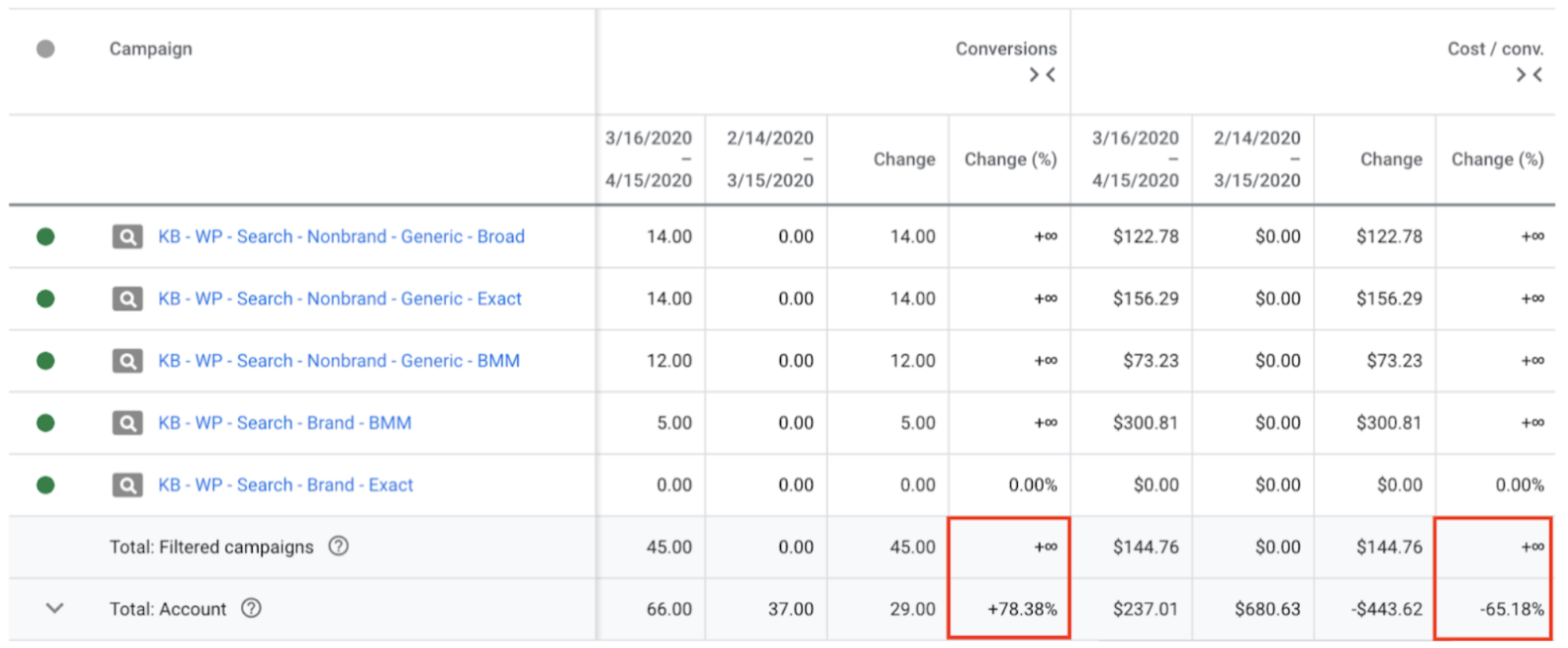
Conversion volume increased 613% Cost per conversion decreased 9%
Get brand new Google ad strategies straight to your inbox every week. 23,739 people already are!
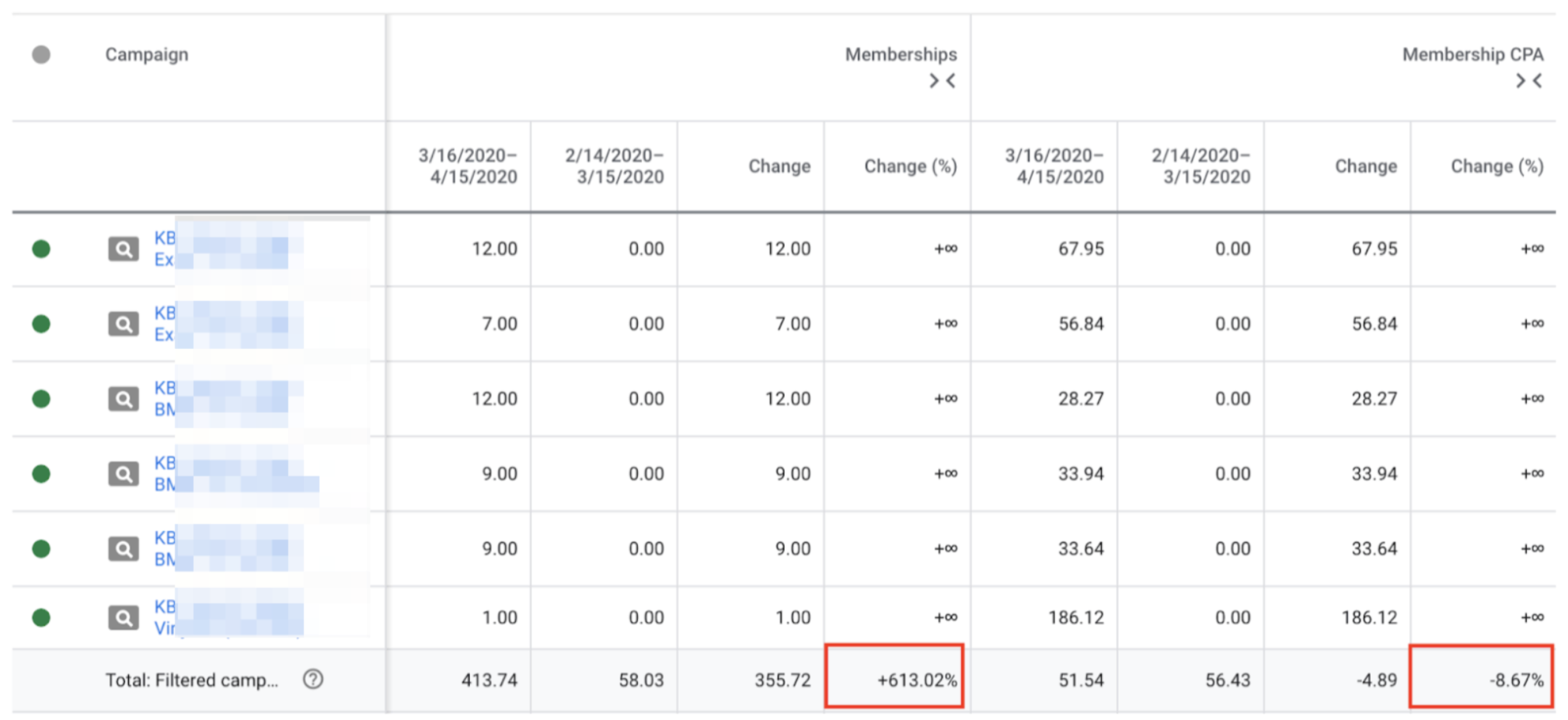
What Is Keyword Tapering?
Keyword Tapering is KlientBoost's answer to the limitations that Single Keyword Ad Groups (SKAGs) often face. While SKAGs can be a great place to start, they aren't immune to the evolution of digital advertising. And as the industry evolves so must our tactics for succeeding in it.
The Evolution Of SKAGs: Keyword Tapering
The goal of Keyword Tapering is to take advantage of a certain learning period at the beginning of your campaigns before doubling down on winning search term bids.
This way, you can achieve the same level of targeting SKAGs offer while ensuring that your exact match campaign is actually that - exact.
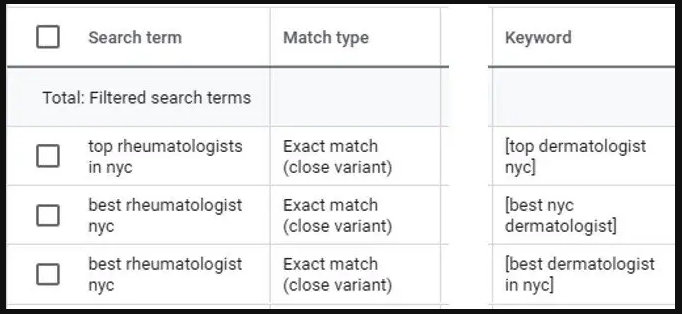
The Evolution Of SKAGs
So I've thrown the term SKAGs around a few times by now. And just in case you don't want to go read the original post, here's a brief summary of how Single Keyword Ad Groups (SKAGs) work:
- The goal of SKAGs is to increase the relevancy of your ads and their Click-Through-Rate (CTR), resulting in an increased Quality Score and overall lowered Cost-Per-Click (CPC). If that brief flash of metrics left you a little dizzy you can read our post on PPC metrics to refresh your memory.
- SKAGs increase your CTR by breaking down your keyword:search term ratio to get as close to a 1:1 correlation as possible. This means that there is little-to-no discrepancy between the keywords you're bidding on and the actual search terms your audience types into the search engine.
- They do so by using all three keyword match types for a single (get it?) isolated keyword. For example, the keyword PPC Agency would look like +PPC+Agency, "PPC Agency", and [PPC Agency], for broad match modified, phrase match, and exact match, respectively. SKAGs don't use ordinary broad match because it brings in the most irrelevant search terms (we also call this having the biggest iceberg, per the Iceberg Effect).
We've seen some very impressive results by using our branded strategy. But however well built SKAGs are, there are still blind spots and inefficiencies that must be adapted. And that's where Keyword Tapering comes in.
The Drawbacks Of SKAGs
As I mentioned earlier, Keyword Tapering is KlientBoost's answer to the limitations of traditional SKAGs. What might these be?
Well, there are basically 2 major issues when it comes to using Single Keyword Ad Groups:
- The excessive use of keyword match types to filter out irrelevant search traffic can end up severely decreasing your available audience. You may be eliminating the irrelevant traffic you don't want to waste budget advertising towards. But you're most likely also leaving some relevant search terms on the table that might be some diamonds in the rough.
- Regardless of how well you optimize your SKAG for your target keyword, there's still a lot of muddled data in the end. Oftentimes, because there are three different match types in use, the search terms coming through are misattributed to the wrong match type. Which can make adjusting your budget a bit of a gamble. But we'll get into that later on.
So, what are we supposed to do about these drawbacks?
I’m glad you asked…
The Next Step: Keyword Tapering
We developed our Keyword Tapering PPC strategy specifically to solve the above two problems.
For starters, Keyword Tapering leverages +Broad +Match +Modified campaigns to mine for any relevant search terms that you may want to advertise towards with isolated campaigns. Keyword Tapering also relies on [Exact Match] only campaigns to eliminate any-and-all irrelevant search terms from those targeted audiences (once you’re ready).
This way you get to extract all the golden nugget search terms out of your mining campaign and transfer them over to your [Exact Match] only campaign for optimal success.
Hence the name ‘Keyword Tapering.’ While your mining campaign tapers down and dwindles, your Exact Match campaign bolsters up (along with your CTRs, conversions, revenue, and ROI).
How Keyword Tapering Works
So I've covered how Keyword Tapering solves the issues of our previous SKAGs methodology. But what good is it if I don't teach you how to set up these campaigns and how to use Keyword Tapering to maximize your ROI?

Well - seeing how it's so urgent - let's get into the specifics of how Keyword Tapering works and how you can get started with this tactic right away.
+Broad +Match +Modified Mining Campaign
For starters, what you're going to need is 2 twin campaigns - one +Broad +Match +Modified, and one [Exact Match]. They should each be exactly the same and target the exact same keywords, and should even have the same budget as you begin your Keyword Tapering.
Now that you have your beginning setup, we can take a look at the "why" behind this setup.
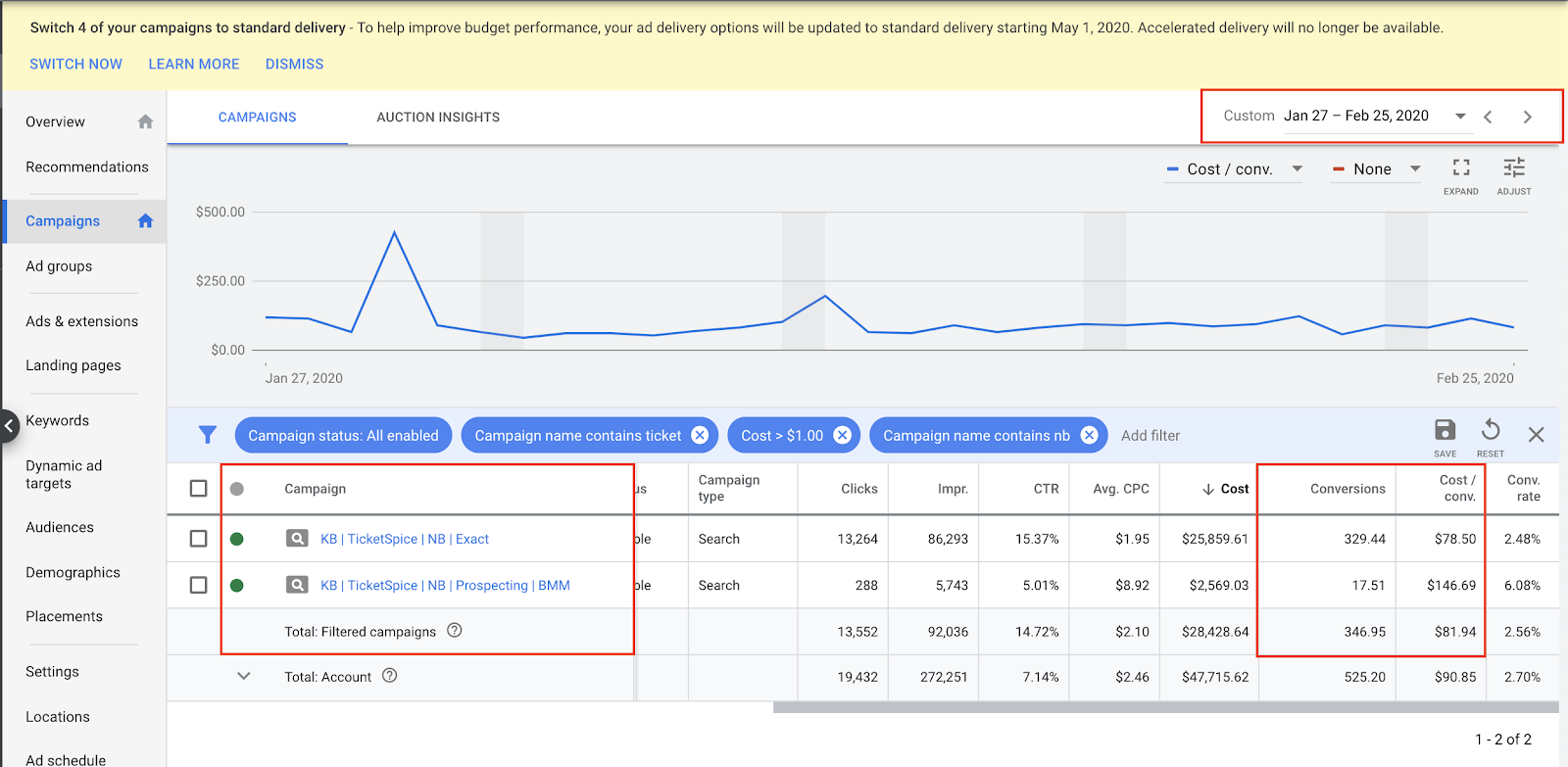
Basically, the only goal of your +Broad +Match +Modified campaign is to mine for the most valuable search terms. Now, for any targeted keyword there can be a large array of relevant and irrelevant search terms. Hence the Iceberg Effect:

But the purpose of the equal budget in Keyword Tapering is to give your two campaigns ample time within the learning phase. What is the learning phase? Well:
"In short, the learning phase is the time period that it takes for the system to learn essentially which patterns are working best.”
Now the learning phase can vary for any brand and any campaign; it really depends on the level of statistical significance you're going for. Regardless, you should take at least 4-5 weeks to accumulate data on which search terms are driving the most conversions from your +Broad +Match +Modified campaign.
Now you're ready to start extracting from your gold mine.
[Exact Match] Campaign Winners Circle
The [Exact Match] campaign is where things start to get exciting in Keyword Tapering. The longer your +Broad +Match +Modified campaign runs, the more nuanced metrics you'll begin to understand.
This, in turn, should hopefully help you identify which search terms are actually the most valuable to target.

These winners are the terms you can extract from your +Broad +Match +Modified campaign and shift over to the [Exact Match] campaign.
WARNING: After you extract these search terms from your +Broad +Match +Modified campaign it's important you negative them out before adding them into your [Exact Match] campaign and letting it ride.
You can do this by simply building out a Negative Keyword List from the search terms that you're extracting and adding that list to your broad modified campaign.
Then, take those winning search terms and add them into your [Exact Match] campaign to target directly.
This way, instead of a sniper trying to go through targets one by one with lethal accuracy, you have a whole field of sharp shooters each with a single target.
That's bound to increase accuracy and efficient targeting.
Search Terms & Budget Shifting
Now as you extract your search terms out of the +Broad+Match+Modified campaign and transfer them over to your [Exact Match], the volume of search terms in your first campaign will begin to taper down. Hence the name of our strategy here.
But that isn't the only thing that's tapering down.
Remember how you started out these twin campaigns with equal budget? Well, time to throw that out the window.
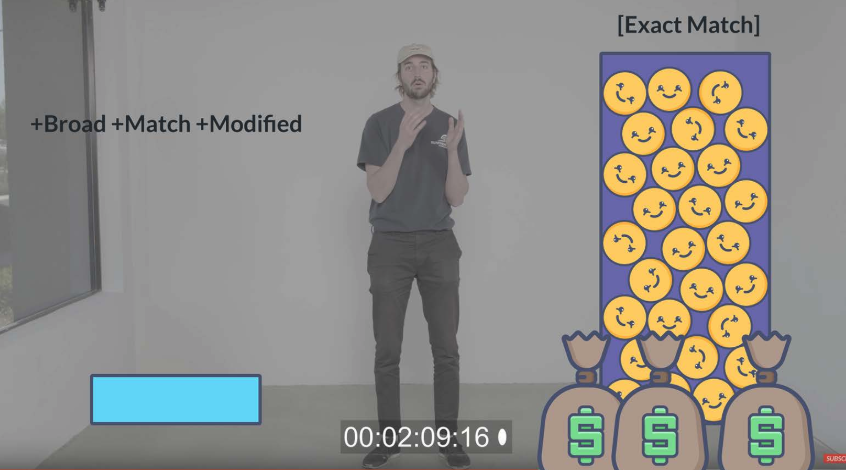
As you shift over your high value search terms into your 'winners circle' [Exact Match] campaign you'll also start to shift over your budget. I mean, who wouldn't want to be spending more money on keywords that they know are driving more conversions, after all?

This should result in 2 major wins for your overall Keyword Tapering strategy:
- Lowering the budget for the mining campaign will lower your Cost/conv. by eliminating bids on less irrelevant search terms.
- Increasing the budget for the winners circle campaign should dramatically increase CTR (click through rate) and Conv. rate by directly targeting only relevant searchers.
Both of these equate to huge wins when you start to extrapolate them into your ROI calculations. And that's where every expert marketer sees their biggest wins - prioritizing ROI over vanity metrics.
Close Variant Scripts To Keep Exact Match ‘Exact’
Before we go any further I should take a moment to cover Google's new Close Variant. Essentially, these are another step for Google in the direction of completely automating our bidding strategies. But, what it really is, is a combination of the old [Exact Match] and "Phrase Match."

What does this mean? It means that [Exact Match] is no longer quite so exact. How harmful can this be? Well, it's tough to think of a lot of examples off the top of your head, but we like to use this one:
Imagine you're a pet supply shop selling dog houses on Google Ads, and you employ some [Exact Match] targeting for the keyword "dog house." Well, because of Close Variants, Google might end up showing your ads for "house dog" instead.
And, because you're not a dog breeder looking for small sized house dogs, you have much less relevance to this search term.

Thankfully, we've developed a Close Variant Script that allows you to comb through your [Exact Match] campaigns to identify any and all search terms that aren't legit exactly "exact."
You can check out the Close Variant Script here, and some of our other favorite scripts in our PPC Scripts blog post.
The Close Variant Script will automatically mine through all of your so-called ‘exact match’ campaigns and identify any search terms that aren’t exactly exact matches. It will then automatically negative these keywords out of your campaign, leaving you with a nice cleaned up and trustworthy [Exact Match] set of search terms to target.
With this script you can clean up your new [Exact Match] campaigns to function with identical and isolated targeting (like it ought to).
Max Out Budget & Impression Share
By now you should have a high-functioning, revved up, steam engine of an [Exact Match] campaign running smoothly and cleanly. Now it's just a matter of maxing out your budget for that campaign in order to max out your impression share.

This is just you doubling down your budget on ads you know have the highest chance of making you actual money and boosting actual ROI.
So, in the case of Keyword Tapering, it's always safe to bet hard on winners.
3 Major Benefits Of Keyword Tapering
Now that you know how Keyword Tapering works, let's take a look at the reasons why it's so worth trying. After all, if the benefits don't outweigh the costs, what's the point in adjusting your PPC strategy to begin with?
Let's take a look at what some of our PPC experts think.
1. Match Type Clarity
The first major benefit of Keyword Tapering is the match type clarity you'll have over which search terms and which match types are the best fit.
Before, even when using the most filtered SKAGs, all the different match types would muddle together. [Exact Match] would come through as "Phrase Match," +Broad +Match Modified would come in as [Exact Match], any combination you can see within the big three.
So, with Keyword Tapering, you can now see from a Gods' eye POV which search terms are worth selecting in your mining campaign.
Then you can pick-and-choose your winners for [Exact Match].
The division of labor makes your match type tracking that much easier. This should also help with future analysis and strategy a little further along the optimization path.
2. Focused Budget For Higher ROAS
The second (and more obvious) benefit of Keyword Tapering is that it can radically boost your ROAS. How? Well, by focusing your budget with pinpoint precision on the winners circle campaign you can get huge returns from your most valuable search terms.
And with the other hand you'll be eliminating spend on the more costly and irrelevant terms that are leftover in your mining campaign. So, the longer the Keyword Tapering runs, the more and more efficient the two will become.
Yes, there may very well be a slight investment in terms of the learning phase of your primary mining campaign.
But it will more than surely pay its weight back in gold.
3. Fixing Exact Match Misattribution
Lastly, Keyword Tapering solves a very annoying problem that Google's Close Variants have created. The issue with [Exact Match] essentially absorbing the old "Phrase Match" is that it makes both "Phrase Match" and +Broad +Match +Modified match types slightly less effective.
Not to mention making [Exact Match] itself a little less trustworthy.
The Close Variants Script that we use in our Keyword Tapering strategy solves this quickly and efficiently. You don't need to necessarily buy into Keyword Tapering to make use of the Close Variants Script.
However, if you want to make the most of your [Exact Match] targeting you don't want to sacrifice click/conversion volume. And if you want to have your cake and eat it too, either the Bottom Feeding Approach or Keyword Tapering is your best bet.
Takeaways: Don’t Skip The Learning Phase
Now, SKAGs have been the backbone of KlientBoost’s brand and PPC strategy for some time now. What does their evolution mean? Well, for starters, it means that 2020 is the year of KB evolution as well. Not only that, but it means that paid search is evolving as an advertising platform.
The more complex and intuitive Google’s algorithms become and the more nuanced our tracking capabilities grow, the more important the learning phase is going to be.
It may cost a pretty penny for the first month or so, but investing in a broader level campaign to start may yield some serious insights into which search terms are your real golden goose eggs. Then you can double down on your budget and win back your ROI with exact match campaigns that only go after winners.
Targeting is almost becoming more like hunting than it is like aiming. So take the time to know your prey - *cough* I mean audience - well.